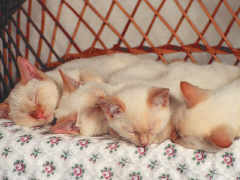 What attitude should I have if I have FM or CFS? What attitude should I have if a family member or friend has FM or CFS? Attitude does have an effect on how we handle stress. This attitude includes both your's and people you are emotionally attached to such as your spouse, parents, siblings and children. People that we live with or care about a lot have an effect on our emotions because we are very much emotionally involved. It's just the social and human nature of people. We depend on close family and friends (our support system) to help us grow and nurture. We do provide the same support in return (assuming that you have a healthy relationship with these people). If you do not have this type of relationship you may want to search out codependence on your search engine.  Read this story which I got from my friend Charles who routinely sends me inspirational poems. He has a gentle, caring, giving spirit and genuinely offers help and encouragement. Then read the research at the bottom on FM & pyshosocial factors effecting how the person responds to FM.  Michael is the kind of guy you love to love. He is always in a good mood and always has something positive to say.  When someone would ask him how he was doing, he would reply, "if I were any better, I would be twins!" He was a natural motivator.  If an employee was having a bad day, Michael was there telling the employee how to look on the positive side of the situation.  Seeing this style really made me curious, so one day I went up to Michael and asked him, "I don't get it! You can't be a positive person all of the time. How do you do it?"  Michael replied, "Each morning I wake up and say to myself, you have two choices today. You can choose to be in a good mood or you can choose to be in a bad mood. I choose to be in a good mood. Each time something bad happens, I can choose to be a victim or I can choose to learn from it. I choose to learn from it.  Every time someone comes to me complaining, I can choose to accept their complaining or I can point out the positive side of life. I choose the positive side of life.  "Yeah, right, it's not that easy," I protested. "Yes, it is, " Michael said. "Life is all about choices. When you cut away all the junk, every situation is a choice. You choose how you react to situations". You choose how people affect your mood. You choose to be in a good mood or bad mood. The bottom line: It's your choice how you live life,"  I reflected on what Michael said. Soon thereafter, I left the Tower Industry to start my own business. We lost touch, but I often thought about him when I made a choice about life instead of reacting to it.  Several years later, I heard that Michael was involved in a serious accident, falling some 60 feet from a communications tower. After 18 hours of surgery and weeks of intensive care, Michael was released from the hospital with rods placed in his back.  I saw Michael about six months after the accident. When I asked him how he was, he replied. "If I were any better, I'd be twins. Wanna see my scars?"  I declined to see his wounds, but I did ask him what had gone through his mind as the accident took place.  "The first thing that went through my mind was the well-being of my soon to be born daughter, " Michael replied. "Then, as I lay on the ground, I remembered that I had two choices: I could choose to live or I could choose to die. I chose to live." "Weren't you scared? Did you lose consciousness?" I asked.  Michael continued, "...The paramedics were great. They kept telling me I was going to be fine. But when they wheeled me into the ER and I saw the expressions on the faces of the doctors and nurses, I got really scared. In their eyes, I read "he's a dead man.  I knew I needed to take action," "What did you do?" I asked. "Well there was a big burly nurse shouting questions at me," said Michael. "She asked if I was allergic to anything. "Yes, I replied." The doctors and nurses stopped working as they waited for my reply. I took a deep breath and yelled, "Gravity.  Over their laughter, I told them, "I am choosing to live. Operate on me as if I am alive, not dead." Michael lived, thanks to the skill of his doctors, but also because of his amazing attitude.  I learned from him that very day we have the choice to live fully. Attitude, after all, is everything. "Therefore do not worry about tomorrow, for tomorrow will worry about itself. Each day has enough trouble of its own," After all today is the tomorrow you worried about yesterday.  "Psychosocial and health status variables independently predict health care seeking in fibromyalgia. Arthritis Rheum 2001 Aug;45(4):362-71 Kersh BC, Bradley LA, Alarcon GS, Alberts KR, Sotolongo A, Martin MY, Aaron LA, Dewaal DF, Domino ML, Chaplin WF, Palardy NR, Cianfrini LR, Triana-Alexander M. Division of Clinical Immunology and Rheumatology, University of Alabama School of Medicine, University of Alabama at Birmingham, 35294-0006, USA. PMID: 11501724 OBJECTIVE: To determine whether variables derived from the self-regulatory model of health and illness behavior accurately predict status as a patient or nonpatient with fibromyalgia (FM). METHODS: Subjects were 79 patients who met American College of Rheumatology (ACR) criteria for FM and 39 community residents who met ACR criteria for FM but had not sought medical care for their symptoms (nonpatients). Subjects were administered 14 measures that produced 6 domains of variables: background demographics and pain duration; psychiatric morbidity; and personality, environmental, cognitive, and health status factors. These domains were entered in 4 different hierarchical logistic regression analyses to predict status as patient or nonpatient. RESULTS: The full regression model was statistically significant (P < 0.0001) and correctly identified 90.7% of the subjects with a sensitivity of 92.4% and a specificity of 87.2%. The best individual predictors of group status were self-reports of self-efficacy, negative affect, recent stressful events, and perceived pain. Relative to nonpatients, patients reported higher levels of negative affect and perceived pain and a greater number of recent stressful experiences, as well as lower levels of self-efficacy. CONCLUSION: Consistent with the self-regulatory model of health and illness behavior, psychosocial and health status variables predict health care-seeking behavior in persons with FM independently of background demographics and psychiatric morbidity. These variables may influence the severity of symptoms experienced by persons with this disorder as well as their health care-seeking behavior, but they are not necessary to produce abnormal pain sensitivity in FM." I got this from CoCure list serv Want to get these email posts?  Back |